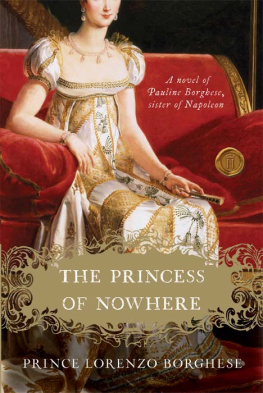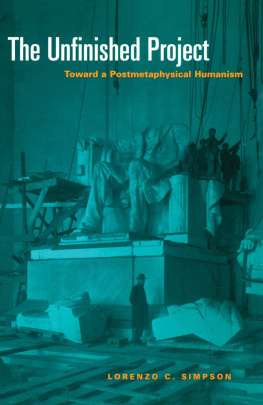Lorenzo Borghese - The Princess of Nowhere
Here you can read online Lorenzo Borghese - The Princess of Nowhere full text of the book (entire story) in english for free. Download pdf and epub, get meaning, cover and reviews about this ebook. year: 2010, publisher: HarperCollins Publishers, genre: Prose. Description of the work, (preface) as well as reviews are available. Best literature library LitArk.com created for fans of good reading and offers a wide selection of genres:
Romance novel
Science fiction
Adventure
Detective
Science
History
Home and family
Prose
Art
Politics
Computer
Non-fiction
Religion
Business
Children
Humor
Choose a favorite category and find really read worthwhile books. Enjoy immersion in the world of imagination, feel the emotions of the characters or learn something new for yourself, make an fascinating discovery.
- Book:The Princess of Nowhere
- Author:
- Publisher:HarperCollins Publishers
- Genre:
- Year:2010
- Rating:4 / 5
- Favourites:Add to favourites
- Your mark:
- 80
- 1
- 2
- 3
- 4
- 5
The Princess of Nowhere : summary, description and annotation
We offer to read an annotation, description, summary or preface (depends on what the author of the book "The Princess of Nowhere " wrote himself). If you haven't found the necessary information about the book — write in the comments, we will try to find it.
The Princess of Nowhere — read online for free the complete book (whole text) full work
Below is the text of the book, divided by pages. System saving the place of the last page read, allows you to conveniently read the book "The Princess of Nowhere " online for free, without having to search again every time where you left off. Put a bookmark, and you can go to the page where you finished reading at any time.
Font size:
Interval:
Bookmark:
THE PRINCESS
OF NOWHERE
PRINCE LORENZO BORGHESE
This book is dedicated to my mother and father, who have been married for more than forty years. They have taught me that communication is the secret to a successful marriage. Without it, love cannot grow, nor can it be complete.
CONTENTS
E verything glittered.
In its verdant setting just beyond the old city walls of Rome, the marble facade of the miniature palace reflected light from hundreds of lanternssome hanging from the upper stories, others on dragon-headed poles fixed in the ground at intervals around the building. Carriages lined the drive, lamps gleaming. Fountains splashed in the moonlight. Servants in gold-trimmed livery and powdered wigs carried trays of glasses filled with champagne. In the supper room, glazed fruits in marzipan were stacked on gilt dishes. The guests, in fantastic costumes and even more fantastic masks, were a kaleidoscope of silk and jewels and feathers. Their eyes burned with a gay, fierce intensity; their gestures seemed to leave trails of sparks in the air. They darted from one activity to the next, drinking, eating, laughing, dancing, flirting. Tomorrow was Lent. Tomorrow would bring ashes and penance and gravity. But tonight was still Carnevale, and once again the Borghese family had opened their villa for the traditional masked ball marking the final hours of the eight-day celebration.
The February night was mild, and many couples were taking a turn in the small formal gardens encircling the building. Their walls and geometrically patterned hedges offered a few dark corners, but between the extra lighting and the hovering servants, no one interested in a serious indiscretion would find them adequate. The wilder (and unlit) groves beyond the neat walls offered better opportunities. That is why the hostess of the ball was now several hundred yards away from the nearest lantern, running down a tree-lined path with a masked cavalier in pursuit.
Pauline was not running very fast. After all, she was planning to be caught. Her pursuer, however, had been injured recently, and Pauline considerately paused on the far side of a fountain to let him rest. He did not seem to understand the rules of the game. Instead of pausing in his turn, he strode around the fountain and fell dramatically to his battered knees, with only a small gasp of pain.
Angel! Goddess! he said, stretching out his arms. I beg you, flee no further! I mean you no harm!
Pauline found this declaration extremely disappointing.
Her suitor evidently failed to see her scowl in the dim light, because he continued in the same melodramatic tone, I shudder when I think that in the darkness you might fall or tear your lovely skin on a bramble! Slow your flight, my queen, and I will slow mine!
Flowery declarations were commonplace in Paulines life, and this one sounded depressingly familiar. It was repeated almost word for word from the libretto of a popular operetta about a coy nymph. Why did men believe women wanted lovers to fall on their knees and declaim bad verse?
She had thought St.-Luc more promising than most of the young men she had met since arriving in Rome. He had followed her through the crowds at a masked revel on the third night of Carnival and, after a series of ever more suggestive remarks, had finally seized her and tried to kiss her. She should have let him have that kiss, Pauline thought. But some imp had prompted her instead to display her power. She had twisted away, smiling. My kisses must be earned, sir, not stolen! she had scolded.
How may I earn them, then? His black eyes had challenged her.
She thought for a moment. In exchange for one of the Barbary horses. One horse, one kiss.
The riderless horses were sent racing down the Corso just before sunset every evening during Carnival, and by the time they reached the end of the street, at the Piazza Venezia, they were very dangerous to approach. Prudent Romans watched the finish from balconies in the palazzi surrounding the square and placed bets on the aftermath of the race as well as on the contest itself. As the horses spilled into the plaza, daring young gentlemen would prove their courage by attempting to grab and subdue a slippery, furious animal who outweighed the would-be handler by upward of a thousand pounds. Even trained grooms were often injured in the process, and the ever-present possibility that the horses would maim or kill someone ensured a large and enthusiastic crowd each night.
And if I capture two?
Two kissesand a lock of my hair.
What if I am even more ambitious? he asked softly.
For three horses, you may name your own reward, she said equally softly, very pleased with the turn the conversation was taking.
He bowed. In that case, I shall take three.
The Chevalier de St.-Luc had been as good as his word: he had caught three horses, one on each of the fourth, fifth, and sixth nights. He had also acquired two broken ribs and a badly bruised knee. That had not prevented him from limping across the piazza to the Palazzo San Marco after each triumph and saluting Pauline, like a gladiator saluting an empress. It was a dramatic sight: below, the bloodied cavalier, the sweating, trembling horse; above, in the midst of the wealthy spectators on their hired balconies, the exquisite young woman, her dark curls framing her mask. By the third performance, the revelers were more focused on this romantic display than on the winning horse.
Pauline was never averse to being singled out for public admiration by conquering heroes. She had rewarded St.-Luc in full view of the crowd. After the first victory, she nodded and smiled. After the second, she blew a kiss. After the third, she tossed down her glove, with a note inside: Find me at midnight Tuesday at the ball given by the Prince and Princess Borghese and you may claim your true prize. It was signed not with her name but with the device on her carnival mask: a swan.
This was the great fiction of Carnival. For eight days, Roman society wore strips of gilded pasteboard on their faces and pretended not to recognize each other. The fiction made many things possible. Pauline Bonaparte Borghese, the new bride of a papal prince, could not openly encourage an exiled enemy of her brother Napoleon to seduce her. But a masked beauty could smile on a masked admirer. Everyone might be well aware that the lady behind the swan feathers was the Princess Borghese, and that the gallant with Harlequin silks across his face was the royalist envoy seeking papal support for the restoration of the Bourbons to the throne of France. But who would violate the unwritten laws of Carnival by saying so out loud?
Unfortunately, St.-Lucs public wooing was not adapting well to more private circumstances. Chivalric adoration was all very well in a large piazza, but now, in the deserted clearing by the fountain, Pauline was hoping for something less bookish.
She looked down in exasperation at her kneeling worshipper. Over the gentle splash of the fountain she could still hear, faintly, the music and laughter of the ball. Had she left all that gaiety for badly delivered lines from an operetta? Get up, she said suddenly. Take off your mask.
He climbed slowly to his feet. But we must remain masked until dawn. That has always been the rule.
Take it off! She tore off her own, a shimmering concoction of gold and swan feathers, and tossed it aside. It landed in the fountain and floated, rocking gently in the moonlight beside a marble seahorse.
St.-Luc swallowed, then untied his own mask and let it fall. He was not as handsome as her husband, Pauline thought resignedly. His features were a bit irregular, and his dark hair was coarse and straight. But he had tried to steal a kiss, and he had wrestled with rearing, sweating horses in front of half of Rome for her sake. Above all, he was French. Pauline was desperately homesick.
Font size:
Interval:
Bookmark:
Similar books «The Princess of Nowhere »
Look at similar books to The Princess of Nowhere . We have selected literature similar in name and meaning in the hope of providing readers with more options to find new, interesting, not yet read works.
Discussion, reviews of the book The Princess of Nowhere and just readers' own opinions. Leave your comments, write what you think about the work, its meaning or the main characters. Specify what exactly you liked and what you didn't like, and why you think so.













